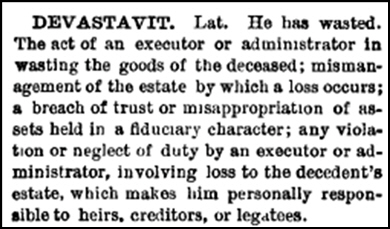The language of the law. Part Latin, part Anglo-Saxon, all confusing.
So after class one day this week at the Genealogical Research Institute of Pittsburgh, a student Anita Boyd had a question.
 She had come across a court case involving an ancestor’s slaveholder and the key argument in the case was over the ownership of three slaves.
She had come across a court case involving an ancestor’s slaveholder and the key argument in the case was over the ownership of three slaves.
It was an estate case, a fight over an inheritance.
And tucked neatly — and incomprehensibly — into the discussion in one paragraph was the comment that a central claim by the plaintiff against the defendant was devastavit.
Devasta-what???
Devastavit.
R-i-i-i-g-h-t.
Even The Legal Genealogist had to look that one up.
Devastavit, it turns out, is Latin for he has wasted. Makes sense when you go on to read that it is:
The act of an executor or administrator in wasting the goods of the deceased; mismanagement of the estate by which a loss occurs; a breach of trust or misappropriation of assets held in a fiduciary character; any violation or neglect of duty by an executor or administrator, involving loss to the decedent’s estate, which makes him personally responsible to heirs, creditors, or legatees.1
In other words, the plaintiff in the case was arguing that the defendant in the case had committed some act with respect to the estate she was managing that caused the estate to lose valuable property — the three slaves.
Devastavit. A devastating loss.
Not in that particular case, since the court found the defendant hadn’t done any such thing.
But whenever you come across it, that’s what it is: a claim against the person handling an estate accusing that person of wasting assets.
SOURCES
- Henry Campbell Black, A Dictionary of Law (St. Paul, Minn. : West, 1891), 363, “devastavit.” ↩


